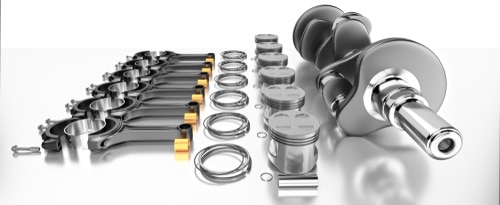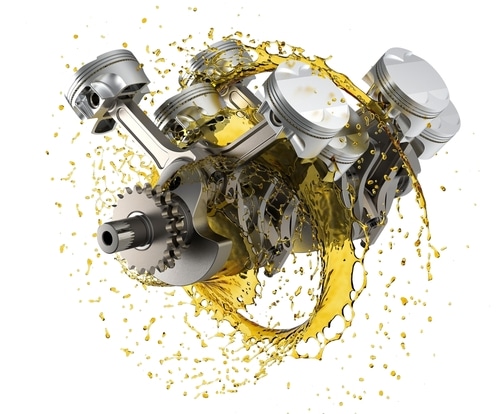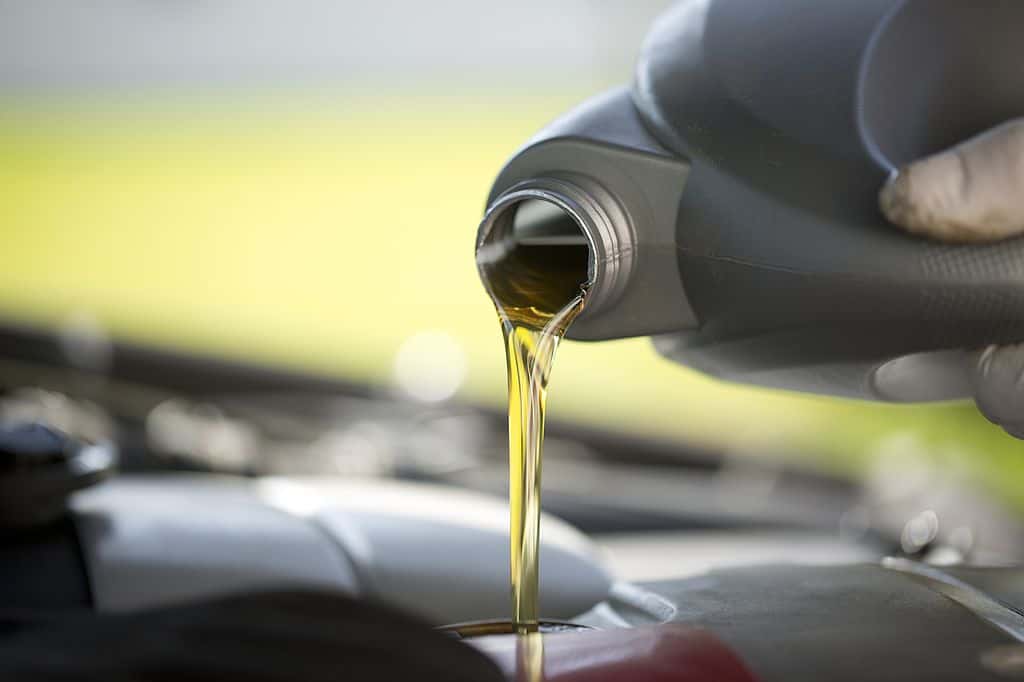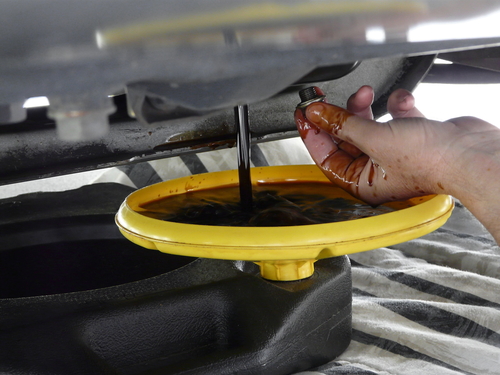If your Scion tC has metal shavings in the oil, it almost always indicates engine damage, but it’s not always easy to tell what is causing the issue. This article will help you figure out what’s going on with your car.
Metal shavings accompanied by a knocking sound typically indicate your tC has spun a bearing or it’s wearing out. A ticking sound is likely caused by an engine starving for oil.

The most common cause of metal shavings in oil is a worn bearing or an oiling issue.
Scion tC Metal Shavings in Oil: Causes
Here are the most common sources of metal flakes in your tC’s oil:
1. Worn Engine Bearings

Worn engine bearings are often accompanied by knocking or harsh vibrations.
Worn bearings are the most common your car will have metal in the oil.
Types of Engine Bearings
Your tC’s engine has three types of bearings.
- Main: They connect the crankshaft to the engine block.
- Rod: Rod bearings hold the connecting rods to the crankshaft.
- Camshaft: Camshaft bearings secure the camshaft to the block or cylinder head (depending on whether your vehicle has an overhead cam).
What Your tC’s Bearings Are Made Of
The inner surface of engine bearings is typically made from various materials, depending on the application. For most engines, bearings are made of hardened steel or bronze.
If a bearing is damaged, worn, or improperly installed, it can cause metal shavings from the bearing material to enter your tC’s oil.
When a mechanic finds metal shavings, they can have the composition of the metal particles tested to determine what they are composed of. If the metal shavings do not react to a magnet, that strongly indicates that a bearing is causing the shavings in your car’s oil.
Symptoms of Bad Bearings
The most apparent sign that bearings are bad is a knocking sound. If you hear a sound, like the engine knocking sound referenced above, assume your Scion tC could throw a rod at any point.
Metal shavings in the oil and knocking indicate that a rod bearing has failed. Your Scion tC may need a complete engine rebuild or replacement when the bearings get this bad.
2. Oiling Issues

Oiling issues are often accompanied by “ticking” noises and maybe a rough idle.
Outside of bad bearings, the second most common reason that you find metal shavings in the oil is an issue with the oil itself. When your tC isn’t getting motor oil properly, it can:
- Damage the piston rings
- Score the cylinder walls
- Wear the bearings
- Flatten the camshaft lobes
No Oil

Oil provides a cushion that keeps your tC’s moving parts from rubbing together. If your car runs out of oil for even a minute, it can do years worth of damage, or the engine can lock up.
Low oil pressure can cause damage in the same way. A clogged oil filter, a bad oil pump, or a worn-out engine are the most common reasons oil pressure gets lower than it should be.
Wrong Viscosity
Oil viscosity measures how thick or thin a particular oil is. It is determined by the size and number of molecules in the oil and how far apart those molecules are from each other.
Generally speaking, thicker oils have a higher viscosity than thinner oils. It is important to note that the viscosity of your tC’s engine oil can be affected by other factors such as temperature, pressure, and flow rate.
Modern engines have incredibly tight tolerances and need the correct oil viscosity more than they did on older engines.
Contaminated Oil

Water can also get into your car’s oil (likely through a blown head gasket), which can lead to a host of engine-related problems. These include decreased oil pressure and increased wear on internal components (metal shavings or even seized pistons).
The only way to be sure that oil contamination is not damaging your tC’s engine is to have the oil tested for water content. If water is found in the oil, it’s essential to determine the source and address it as quickly as possible.
The most common cause of water contamination in engine oil is condensation, which can form from an engine’s daily heating and cooling. Over time, this can lead to excessive amounts of water accumulating in the oil, so it’s important to regularly check your Scion tC for and address any signs of water contamination.
Other causes of water in your car’s engine oil include defective or worn-out components, such as the head gasket. If there is a blown head gasket, it could be allowing coolant to leak into the oil pan and mix with the oil.
3. Other Causes
Other common sources of metal shavings in the Scion tC’s oil are worn-out or faulty oil pump, blocked filter, or other internal problems. In some cases, metal shavings can be caused by external factors such as debris or dirt getting into the oil supply or an improperly manufactured component.
What Metal Flakes do to an Engine
Metal shavings can do a lot of damage to your tC’s engine in a short amount of time. That’s why it’s important to do something about them right away when you discover them.
Metal shavings in oil can cause severe damage. They are abrasive and can score moving parts, leading to wear and tear over time that can ultimately cause the engine to fail.
In addition, metal shavings act like tiny magnets, collecting dirt and other contaminants which can build up and clog filters or interfere with seals and gaskets. This debris build-up is a common cause of reduced performance for many engines and increased fuel consumption.
What to Do if You Have Metal Shavings in Your Oil
We recommend taking your Scion tC to a professional as soon as possible. If your engine is knocking or ticking, towing it there might save the engine from further damage.
